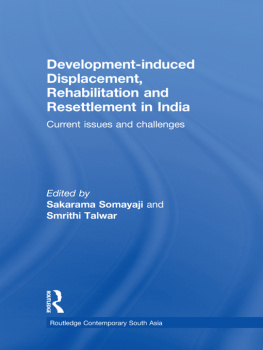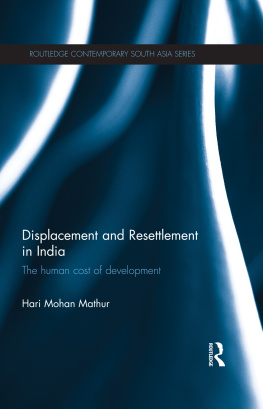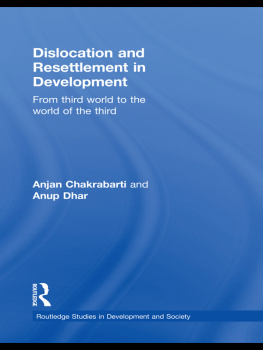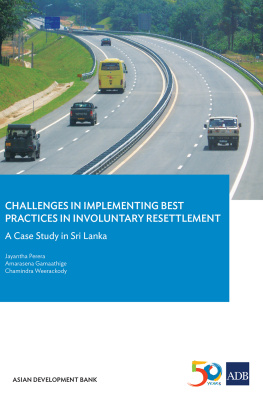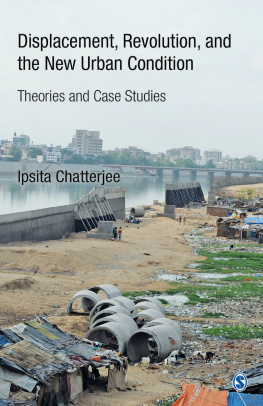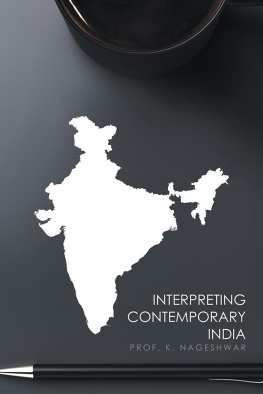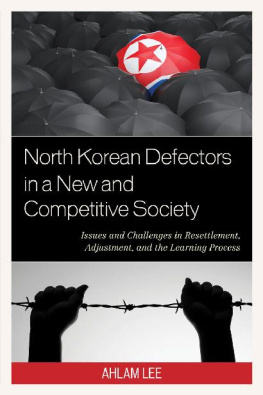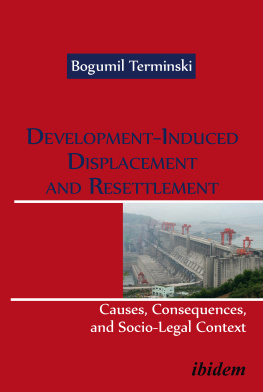Development-induced
Displacement, Rehabilitation
and Resettlement in India
Compulsory land acquisition and involuntary displacement of communities for a larger public purpose capture the tension of development in the modern state, with the need to balance the interests of the majority while protecting the rights of the minority. In India, informal estimates of involuntary resettlement are around 50 million people over the last five decades, and three-fourths of those displaced still face an uncertain future.
Growing public concern over the long-term consequences of this has led to greater scrutiny of the rehabilitation and resettlement process, particularly for large development projects. This book examines a number of new policy formulations put in place at both the central and state levels, looking at land acquisition procedures and norms for the rehabilitation and resettlement of communities. The book combines a theoretical analysis of the proposed regulatory framework with detailed case studies that examine the application of these norms in specific geographic contexts across the country. It brings together contributory analysis by some of the countrys most engaged administrators, academics, and activists in the field, and is a useful contribution to Development Studies.
Sakarama Somayaji heads the Relocation and Rehabilitation group within The Energy and Resources Institutes (TERI) Social Transformation Division. He has worked extensively on issues pertaining to the rehabilitation of project-displaced people, including three years at the Council for Social Development in New Delhi, India.
Smrithi Talwar is a Fellow and Chief Coordinator of the Director Generals Office in TERI. She has led a multidisciplinary team of specialists in developing and implementing a long-term rehabilitation strategy for project-displaced people in Singrauli District, Madhya Pradesh.
Routledge Contemporary South Asia Series
1 Pakistan
Social and cultural transformations in a
Muslim nation
Mohammad A. Qadeer
2 Labor, Democratization and
Development in India and Pakistan
Christopher Candland
3 ChinaIndia Relations
Contemporary dynamics
Amardeep Athwal
4 Madrasas in South Asia
Teaching terror?
Jamal Malik
5 Labor, Globalization and the State
Workers, women and migrants
confront neoliberalism
Edited by Debdas Banerjee and
Michael Goldfield
6 Indian Literature and Popular
Cinema
Recasting classics
Edited by Heidi R.M. Pauwels
7 Islamist Militancy in Bangladesh
A complex web
Ali Riaz
8 Regionalism in South Asia
Negotiating cooperation, institutional
structures
Kishore C. Dash
9 Federalism, Nationalism and
Development
India and the Punjab economy
Pritam Singh
10 Human Development and Social
Power
Perspectives from South Asia
Ananya Mukherjee Reed
11 The South Asian Diaspora
Transnational networks and changing
identities
Edited by Rajesh Rai and Peter Reeves
12 PakistanJapan Relations
Continuity and change in economic
relations and security interests
Ahmad Rashid Malik
13 Himalayan Frontiers of India
Historical, geo-political and strategic
perspectives
K. Warikoo
14 Indias Open-Economy Policy
Globalism, rivalry, continuity
Jalal Alamgir
15 The Separatist Conflict in Sri Lanka
Terrorism, ethnicity, political economy
Asoka Bandarage
16 Indias Energy Security
Edited by Ligia Noronha and Anant
Sudarshan
17 Globalization and the Middle
Classes in India
The social and cultural impact of
neoliberal reforms
Ruchira Ganguly-Scrase and Timothy J.
Scrase
18 Water Policy Processes in India
Discourses of power and resistance
Vandana Asthana
19 Minority Governments in India
The puzzle of elusive majorities
Csaba Nikolenyi
20 The Maoist Insurgency in Nepal
Revolution in the Twenty-first Century
Edited by Mahendra Lawoti and Anup
K. Pahari
21 Global Capital and Peripheral
Labour
The history and political economy of
plantation workers in India
K. Ravi Raman
22 Maoism in India
Reincarnation of ultra-left wing
extremism in the 21st Century
Bidyut Chakrabarty and Rajat Kujur
23 Economic and Human
Development in Contemporary India
Cronyism and fragility
Debdas Banerjee
24 Culture and the Environment in
the Himalaya
Arjun Guneratne
25 The Rise of Ethnic Politics in
Nepal
Democracy in the margins
Susan I. Hangen
26 The Multiplex in India
A cultural economy of urban leisure
Adrian Athique and Douglas Hill
27 Tsunami Recovery in Sri Lanka
Ethnic and regional dimensions
Dennis B. McGilvray and Michele R.
Gamburd
28 Development, Democracy and the
State
Critiquing the Kerala model of
development
K. Ravi Raman
29 Mohajir Militancy in Pakistan
Violence and transformation in the
Karachi conflict
Nichola Khan
30 Nationbuilding, Gender and War
Crimes in South Asia
Bina DCosta
31 The State in India after Liberalization
Interdisciplinary perspectives
Edited by Akhil Gupta and
K. Sivaramakrishnan
32 National Identities in Pakistan
The 1971 War in contemporary
Pakistani fiction
Cara Cilano
33 Political Islam and Governance
in Bangladesh
Edited by Ali Riaz and C. Christine Fair
34 Bengali Cinema
An other nation
Sharmistha Gooptu
35 NGOs in India
The challenges of womens
empowerment and accountability
Patrick Kilby
36 The Labour Movement in the
Global South
Trade unions in Sri Lanka
S. Janaka Biyanwila
37 Building Bangalore
Architecture and urban transformation
in Indias Silicon Valley
John C. Stallmeyer
38 Conflict and Peacebuilding in Sri
Lanka
Caught in the peace trap?
Edited by Jonathan Goodhand,
Jonathan Spencer and Benedict Korf
39 Microcredit and Womens
Empowerment
A case study of Bangladesh
Amunui Faraizi, Jim McAllister and
Taskinur Rahman
40 South Asia in the New World Order
The role of regional cooperation
Shahid Javed Burki
41 Explaining Pakistans Foreign
Policy
Escaping India
Aparna Pande
42 Developmentinduced
Displacement, Rehabilitation and
Resettlement in India
Current issues and challenges
Edited by Sakarama Somayaji and
Smrithi Talwar

